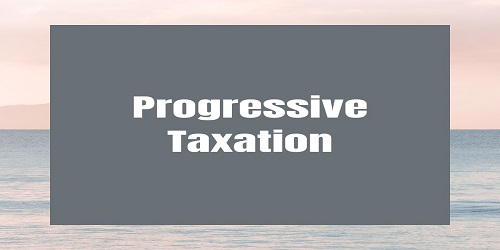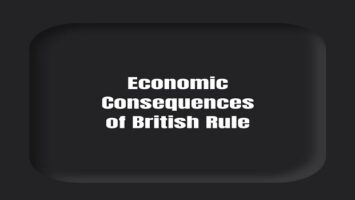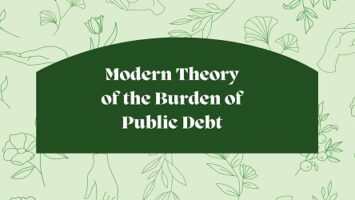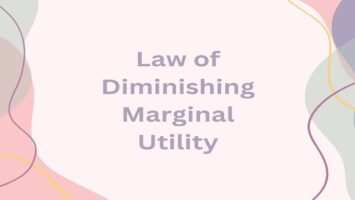Table of Contents
What is Progressive Taxation?
Progressive taxation is a taxation system where the rate of tax increases as the income or wealth of an individual or entity increases. In other words, people with higher incomes are required to pay a larger percentage of their income as tax than those with lower incomes.
This system is based on the principle of “ability to pay,” which means that individuals with higher incomes have a greater ability to pay taxes than those with lower incomes. Progressive taxation is commonly used by governments to achieve greater income equality by redistributing wealth from the rich to the poor.
An example of a progressive tax is the income tax system, where individuals with higher incomes are taxed at a higher rate than those with lower incomes. Another example is the estate tax, which is a tax on the transfer of wealth from one generation to the next.
Arguments in Favor of Progressive Taxation:
The principle of progression in taxation has been universally accepted. The principle has been favored by different writers on a number of grounds, some of which are as follows.
(1) It has been justified on the ground that it secures equality in sacrifice and leads to justice in the distribution of the burden of taxation, as it is based on the principle of ability to pay. Moreover, the principle of the ability to pay can be put into practice through progressive taxation. For instance, the deduction of $10 from A’s income of $100, and $10,000 from B’s income of $1,00,000 as tax, will bring greater suffering to A than to B. In other words, A has made a greater sacrifice than B because the marginal utility of money decreases as the income increases. However, A and B can make an equal sacrifice; if B’s income is now subject to higher tax rates, say 10 percent instead of 10 percent at present, and thus the deduction from B’s income would be 40,000 instead of 10,000. In this saturation, A and B may make more or less equal sacrifices.
(2) Progressive taxation has been justified on the ground that it serves as a powerful instrument for reducing the inequalities of income. Professor Kaldor has also emphasized the role of progressive taxation to reduce the inequalities of income.
(3) Progressive taxes have been justified on the ground that they are economical, as the cost of the collection does not rise with the increase in the rates on taxes.
(4) Progressive taxes have also been justified on the ground that they are elastic, the need for increased public revenue can easily be fulfilled by increasing the rates of taxes, i.e., the public revenue can be increased at any time by increasing the rates of taxes and vice-versa.
(5) Progressive taxes have been justified because the public revenue automatically increases with the increase in economic activities and income since the rise in income is automatically taxed at higher rates under this system.
(6) Progressive taxation may helpful in curbing inflationary trends, as it reduces consumption demand, and the resources, thus mobilized may be directed towards productive investment which may increase the supply of commodities. Hence, an inflationary trend may be curbed, and growth and economic stability may be achieved.
Finally, the loss of satisfaction for the community as a whole will be minimum only under conditions of a progressive tax system, as the principle of least sacrifice states that the sacrifice imposed upon the community as a whole will be the least. If the richer sections are taxed at high rates, the poorer sections are either exempt from taxation or are taxed at low rates. Moreover, Prof. Pigou pointed out that the basis of satisfaction of many rich people is not the amount of their wealth; but because they are relatively richer than others. Hence, if the income of all the rich people is reduced by way of progressive taxation and their relative position does not change, the loss of satisfaction for them will not be very great. Two persons, who are equally rich before paying the tax, will remain equally rich after paying the tax. Though both of them will be proper than before and will continue to be as rich as each other as before, because their relative position is not changed, hence the loss of satisfaction will not be much.
Hence Prof. Taylor justified the progressive taxation because of the following advantages:
- Revenue productivity.
- Optimum individual allocation of the tax burden.
- Promotion of stability and growth.
- Optimum social allocation of resources.
Objections to Progressive Taxation:
The following objections have been advanced against the policy of progressive taxation:
In the first place, it has been pointed out that progressive taxation is entirely arbitrary. There is no guiding principle according to which tax rates are determined. There can be an infinite scale of progression and no simple and intelligible reasons can be given for selecting one preference over others.
Secondly, progressive taxation is based on the assumption that the marginal utility of money is less for a rich person as compared to a poor one. But, satisfaction is a mental or psychological phenomenon, one man’s satisfaction cannot be compared with another. Here, it should be noted that the law of diminishing marginal utility has been applied in the field of public finance on the assumption that human behavior is similar under similar circumstances. However, there can be exceptions, but generally, people placed in similar circumstances experience similar satisfaction. Hence the application of progressive taxation is valid under the assumption that the marginal utility of money of the rich people is less than that of the poor.
Thirdly, it has been argued that progressive taxation may adversely affect production and discourage capital formation. It may, therefore, discourage the growth of the industry. Mill pointed out that “to tax the higher incomes at a higher percentage than smaller, is to lay a tax on industry and economy.” But, if progressive taxation is not allowed to reach that point, there it may hamper the formation of capital and the growth of industry, there should be no basis for such apprehension. Moreover, it is said that progressive taxation does not affect the desire to save more, as it is a tax on surpluses.
Fourthly, it is said that progressive taxation punishes prudence and virtue and rewards extravagance and idleness. William Newmarch said that graduation or progression is, “Confiscation, punishing prudence and virtue, taxing a man for being good to himself and doing good to others.” Similarly, J. S. Mill said that beyond a certain limit, a graduated tax appeared to him to be an entirely unjust mode of taxation, and, in fact, a graduated robbery. Here, it should also be pointed out that large incomes and large properties are not always the result of hard work and thrift. Moreover, large income and large properties may have been possible, because of existing social, economic, legal, and public instruction and hence they must be taxed at progressive rates.
Finally, the danger of evasion is another objection. There would be very great efforts to evade a steeply graduate tax than to a proportional tax. There must be false declarations where there are special duties on the better kinds of goods, and in case of income and property taxes, the assesses can submit false returns. Hence, in the case of progressive taxation, the motives for evasion would be stronger and the means of prevention less effective than in the case of a proportional tax. However, the objection may be removed through efficient and strong tax-collecting machinery.









Comments (No)